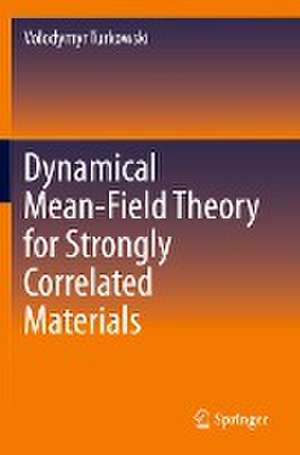Dynamical Mean-Field Theory for Strongly Correlated Materials
Autor Volodymyr Turkowskien Limba Engleză Paperback – 23 apr 2022
| Toate formatele și edițiile | Preț | Express |
|---|---|---|
| Paperback (1) | 742.21 lei 38-44 zile | |
| Springer International Publishing – 23 apr 2022 | 742.21 lei 38-44 zile | |
| Hardback (1) | 858.45 lei 38-44 zile | |
| Springer International Publishing – 23 apr 2021 | 858.45 lei 38-44 zile |
Preț: 742.21 lei
Preț vechi: 976.59 lei
-24% Nou
Puncte Express: 1113
Preț estimativ în valută:
142.02€ • 154.75$ • 119.67£
142.02€ • 154.75$ • 119.67£
Carte tipărită la comandă
Livrare economică 19-25 aprilie
Preluare comenzi: 021 569.72.76
Specificații
ISBN-13: 9783030649067
ISBN-10: 3030649067
Pagini: 392
Ilustrații: X, 392 p. 115 illus., 86 illus. in color.
Dimensiuni: 155 x 235 mm
Ediția:1st ed. 2021
Editura: Springer International Publishing
Colecția Springer
Locul publicării:Cham, Switzerland
ISBN-10: 3030649067
Pagini: 392
Ilustrații: X, 392 p. 115 illus., 86 illus. in color.
Dimensiuni: 155 x 235 mm
Ediția:1st ed. 2021
Editura: Springer International Publishing
Colecția Springer
Locul publicării:Cham, Switzerland
Cuprins
General Formulation.- Impurity solvers.- Physics of the one-band Hubbard model.- Multi-orbital systems.- Nanosystems (films, 2D and finite systems).- Beyond the local impurity approximation DΓA.- Nonequilibrium DMFT.- Static Properties of materials: DFT+DMFT.- Dynamical Properties of Materials: TDDFT+DMFT.
Notă biografică
Volodymyr Turkowski is a Research Assistant Professor at the University of Central Florida. After getting his Masters (1995) and PhD (1998) degrees from Kiev University, he was a postdoctoral researcher in several places in Europe and USA. Currently, his main research interests are materials with strong electron-electron correlations and ultrafast charge dynamics in novel materials. He has contributed to several developments in dynamical mean-field Theory (DMFT), including the non-equilibrium case (non-equilibrium DMFT), merging it with ab initio approaches for nanosystems (nano-DFT+DMFT) and systems out-of-equilibrium (TDDFT+DMFT). He has authored/co-authored of more than 70 papers and four book chapters.
Textul de pe ultima copertă
This is the first book that provides a detailed summary of one of the most successful new condensed matter theories - dynamical mean-field theory (DMFT) - in both static and dynamical cases of systems of different sizes. DMFT is one of the most successful approaches to describe the physical properties of systems with strong electron-electron correlations such as bulk materials, multi-layers, surfaces, 2D materials and nanostructures in both metallic and insulating phases. Strongly correlated materials usually include partially-filled localized d- or f-orbitals, and DMFT takes into account crucial for these systems time-resolved interaction between electrons when they “meet” on one atom and occupy one of these orbitals. The First Part of the book covers the general formalism of DMFT as a many-body theory, followed by generalizations of the approach on the cases of finite systems and out-of-equilibrium regime. In the last Chapter of the First Part we discuss generalizations ofthe approach on the case when the non-local interactions are taken into account. The Second Part of the book covers methodologies of merging DMFT with ab initio static Density Functional Theory (DFT) and Time-Dependent DFT (TDDFT) approaches. Such combined DFT+DMFT and DMFT+TDDFT computational techniques allow one to include the effects of strong electron-electron correlations at the accurate ab initio level. These tools can be applied to complex multi-atom multi-orbital systems currently not accessible to DMFT. The book helps broad audiences of students and researchers from the theoretical and computational communities of condensed matter physics, material science, and chemistry to become familiar with this state-of-art approach and to use it for reaching a deeper understanding of the properties of strongly correlated systems and for synthesis of new technologically-important materials.
Caracteristici
Presents a detailed and coherent summary of different aspects of DMFT, including its combination with other techniques, and approaches beyond DMFT Addresses both static and dynamic properties of strongly correlated systems from bulk solids and 2D materials to nanostructures Written by a co-developer of non-equilibrium DMFT and DMFT+TDDFT
